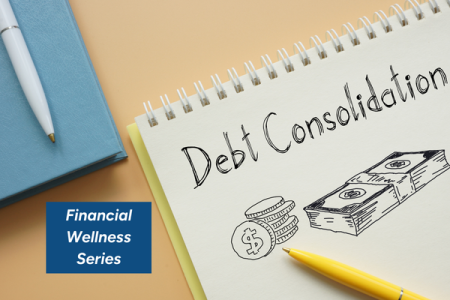Marriage and debt are like pregnancy and . . . nausea. For most people, you can’t have the exciting part without the latter. In fact, 63% of marriages start out in debt.1
Take Grace’s story, for example. She was completely debt-free with $10,000 in the bank before she got married. Awesome! But when she said “I do” to her fiancé, Drew, she also agreed to $44,000 in student loans that Drew brought to the table. Ouch!
“It was a challenge combining our money. I knew I needed to view it as our debt because we were now one,” Grace said.
Combining marriage and debt isn’t unusual for a newly married couple. It’s all too common for at least one person to bring a significant amount of debt baggage into the marriage. Yes, you or your spouse-to-be may have made some money mistakes in the past—like we all have—but now you’re a team, and it’s time to attack it together. You two have to get to the point where you say, “This is our marriage and our debt now. And it’s our money, so we’ll pay this debt off together,” just like Grace did.
While marriage and debt can be a recipe for all kinds of arguments over money, couples who work together on their money are generally closer because the trust factor is much higher. So, let’s talk about how to do that!
4 Steps to Navigate Marriage and Debt
If you’re worried about marrying someone with debt, just know that you can help each other. You’re a team, and the team’s going to win together. Here’s what to do:
1. Combine your finances once you’re married.
Like I said, if you’re married, there should be no such thing as my money or your money—it’s our money. If you’re just dating or engaged, don’t pay anything on the other person’s debt until you’re married. Just keep paying on your own debt (if you have it) or save up a pile of cash if you’re already debt-free. But as soon as you come back from the honeymoon, open up a joint bank account and count every dollar of income as money you both have to work with.
2. Set a budget date night.
The key to surviving marriage and debt is to budget together. It may seem like a simple answer, but it’s the answer to most money problems in marriage.
Find a place and a time before the next month begins to sit down and make it your budget night. Make sure you’re both able to be there. This can be at a restaurant, your kitchen table or on the back porch. My husband, Winston, and I usually do our monthly budget while we relax on the couch together.
Remove any distractions. Turn off the TV. If you need a little extra motivation, plan a budget date night and get ready to chat about money. Whatever you have to do to make this time appealing to you both, do it.
3. Build a $1,000 emergency fund.
Make sure you guys have $1,000 in the bank as a starter emergency fund to complete Baby Step 1, then work on paying off the debt. Now, if one of you had a $1,000 emergency fund before, don’t use that money to pay off debt—you’ll just be digging out a hole that’s going to fill back up when life happens. Keep $1,000 in the bank together, on purpose, from the start. Then, start a long-term strategy for navigating through the Baby Steps as a couple.
4. Never, ever play the blame game.
Remember, once you’re married, it’s our debt and our money, and it’s up to the two of you to work together and pay it off. After three and a half years of blood, sweat and tears, Grace and Drew became debt-free! By making a plan and sticking to it as a team, they reached freedom—as a couple. “I never had debt when I was single, so once we paid off the debt together, it felt like a huge accomplishment!”
The Dr. John Delony Show helps people through real-life marriage challenges. Listen now!
Grace and Drew made a poster of a thermometer and put it on their fridge to track progress. Every time they paid off some debt, they colored it a little higher, which showed them that every little bit made a difference.
“Seeing that was really motivating,” Grace said. Having the same end goal and working hard to accomplish it made them feel closer to each other.
But it wouldn’t have been possible if they had played the blame game that so many couples do. Grace could’ve stuck up her nose and made Drew fend for himself, but instead, they tackled the debt together.
If you’re married to (or planning to marry) someone with debt, here are some tips to keep you out of that blame trap:
- Don’t refer to it as your debt. That one little word makes a big difference in both of your perspectives.
- Don’t hold the fact that they had debt over their head. Trust me, everyone’s happier this way! And if you were the one who brought the debt in, don’t hold it over your own head!
- Appreciate the differences you bring to the table. When it comes to money and marriage, I often find one spouse is a spender and the other is a saver. Or one may be motivated by security and the other is motivated by status. There are seven different money tendencies I identify when I’m helping couples work together. To see where you and your spouse land, take my free quiz.
- Don’t give up! Stick to the plan and stick together. It’s not easy, but it’s definitely worth it. Find ways to motivate each other to stay gazelle intense about living without debt for good.
But Wait . . . What About Wedding Costs?
I’m often asked if it’s wise to put your debt snowball on hold to slightly enhance a modest wedding. My answer is, sure, if you’re passionate about that. Now, if you’re wanting to spend an extra $50,000 on the wedding instead of getting out of debt, then we’d have to talk.
You don’t have to spend a ton of money and go into debt to plan a beautiful, memorable day. A bigger budget doesn’t mean a better marriage.
Marrying Someone With Debt Isn’t a Death Sentence for Your Marriage
When it comes down to it, taking on some debt is a small price to pay to be with your lifetime love. Talking about these things openly will strengthen your relationship and keep debt from getting in the way of a wonderful marriage.
The way you deal with debt in your marriage will affect your family tree for generations to come. I dive into this in my brand-new book, Know Yourself, Know Your Money.
This isn’t just another money book. I want to help you and your spouse discover how your behaviors, fears and beliefs affect everything you do with your money. Check out my new book and learn how to get on the same page with your spouse about money.
Read the full article here









